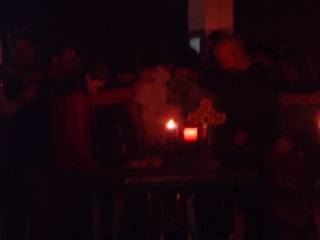 Ordination and the Emerging Church
Ordination and the Emerging Church
I've been a licensed Baptist minister for a number of years now. In the Baptist church that really isn't saying much. There are no hierarchical rules that must be followed to be licensed, and a license is not necessary to serve in a church. Actually, I was licensed by my first pastorate after I had served in the position for 6 months, and then primarily for tax reasons.
The IRS requires licensing or ordaining if a minister is going to take advantage of the tax breaks available to the clergy. Normally, ordination would be required, but the tax law is a little loose in its reading and allows for licensing if there is no significant difference in the duties performed by persons holding a license and ordained clergy. Since there is no significant difference in Baptist culture, and the church I served in had no ordained people in it, licensing was the route taken.
Now, here I am some years later. I am still only licensed and I serve as a teaching pastor in our small congregation. In a month, I will be moving to Abilene and away from anyone with any knowledge of my faith journey. As a going away present, a parting gift, the church in which I serve is going to ordain me because I asked them to (actually, they offered when i was initially hired and I finally accepted the offer). So why did I ask after all this time?
1. To help establish credibility as a minister, because some people must see that piece of paper
2. Because I love the name of our church, Christ's Church, and would rather read that on an ordination certificate than So and so Baptist Church.
3. Because I want the people who helped to form me as a Christian to be able to share in the experience
For some reason, these all seem like selfish reasons, but in the Baptist tradition God ordains and calls His ministers. Ordination from a local body serves to confirm more than anything else. So why do we continue to ordain? With or without the paper for the wall, I will continue to proclaim the gospel. That is what I am called to do. Why do I feel compelled to have paper credibility when I already have credibility and confirmation of my call. It has been prophesied over me (It was prophesied over me as a baby by an uncle who pastors in a different denomination, and I wasn't told of this until after I responded to God's call). It was confirmed by the church that commissioned my family and sent us out to our first pastorate. It was confirmed by my first pastorate when they licensed me, and it is regulary confirmed by the church I currently serve in when the pastor gives up his pulpit to allow me to preach 2 or more times a month. it makes me wonder..
So what is my point? I'm not sure other than to ask the question what role will ordination serve in the emerging church? Is formal ordination going to lend credibility to leaders who are being judged on their authenticity and transparency? Or, will formal ordination become even more ornamental as denominational walls are blurred and skewed? (The picture above is, in a sense, the ordination of
seth woods as a minister in the
Mosaic Austin Faith Community) I don't know, but I would love to hear/read what ya'll think. In the mean time, I guess I'll try to figure out my situation.



